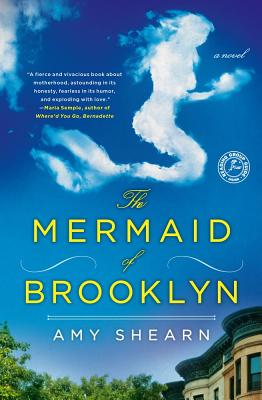by Amy Shearn
The tag line for Amy Shearn’s sophomore novel, The Mermaid of Brooklyn, reads “Sometimes all you need in life is a fabulous pair of shoes—and a little help from a mermaid.” Now, if you ask me, that sounds like some kind of light chick-lit novel—and there’s nothing wrong with light chick-lit. But that’s not what you’ll find in these pages. That’s selling Amy Shearn’s novel way too short.
First, it’s not chick-lit at all. If you must classify, put this one down as women’s fiction, but with a sharply-observed, Perotta-esque take on the village-within-a-city that is Park Slope, Brooklyn. It’s the story of Jenny Lipkin, the overwhelmed mother of an infant and a toddler. In the novel’s opening pages, her husband Harry calls to tell her he’s stopping to pick up cigarettes on his way home. He never arrives. Days pass, and no one has heard from Harry, no one can reach him. This would, of course, be upsetting under any circumstances, but this isn’t the first time it’s happened. Harry has issues of his own. But he’s never stayed away this long before…
Jenny is an appealing protagonist, appealing in her imperfection. She’s not extraordinarily beautiful, clever, or together. Quite the contrary, she was barely getting through her days when she had her husband’s support. Now the struggle really begins. The kids, the bills, the home: “This was not one of those ‘Oh, ha, sorry it’s such a mess’ moments. It was dangerously messy. It was call-child-services-doubt-the-mental-health-of-the-mother messy. It was TLC-reality-programming messy. We cohabited with dust bunnies I knew by name…” That’s a funny passage, and there is a good amount of humor and some real wit within the text, but there’s also a fair amount of darkness and desperation. I suspect that more than a few women will relate to Jenny’s feelings of bone-deep exhaustion and inadequacy.
Where, you may be asking, is the mermaid in all this? Where indeed? There’s no mermaid in sight
until more than a quarter of the novel has passed. And this nameless entity is not, perhaps, the mermaid you’re expecting. She’s no fairytale friend. This mermaid of Brooklyn is a creature of Slavic myth, a rusalka. I’m a connoisseur of mermaid legends and lore, and this was a new one on me. Per Wikipedia, “In Slavic mythology, a rusalka is a female ghost, water nymph, succubus, or mermaid-like demon that dwelt in a waterway.” I’ll leave you to discover how Jenny encounters her, and the exact nature of their relationship. It’s not entirely negative, as the above might lead one to believe, but it’s not exactly positive either. Jenny muses:
“I was starting to realize the rusalka wasn’t the best person to listen to. What did I know about her? Who WAS she, this new self of mine, this recently arrived Siamese twin? It was beginning to strike me, in moments of sickening dread, that I might be just another sailor coiled in her hair, seduced by her promises of impossible passions, believing I was being buoyed up as she slowly strengthened her squeeze, dragging me down to the ocean floor.”Notwithstanding an amusing tendency to pepper her dialogue with Yiddish, there’s an opaqueness to the rusalka that leaves readers a lot of room for conjecture as to her nature. But despite this supernatural element, this is an unusually realistic look at one woman’s struggle to find her way through neighborhood politics, temptation, depression, and family life. I’m neither married nor a mother, but I related tremendously to Jenny, and I cared about her struggles.
The writing in The Mermaid of Brooklyn is terrific. I don’t use phrases like “chick-lit” or “women’s fiction” in a pejorative manner, but rather to describe genres of fiction. Still, those genres will give certain readers expectations as to literary quality. Whatever those expectations are, the depth of this book will surpass them. Shearn uses language in clever and observant ways. “We’d been in the park all morning, and I was Pompeiied in a gritty paste of apple juice, dirt, and sandbox.” Or, as two mothers express their exhaustion: “It was an exchange we shared about thirty times a day, like songbirds trading musical phrases.”
This was my introduction to Ms. Shearn’s work. I came to it with expectations that weren’t met at all. Fortunately, they were significantly exceeded. The Mermaid of Brooklyn is a whole lot more than a book about a fabulous pair of shoes.

No comments:
Post a Comment